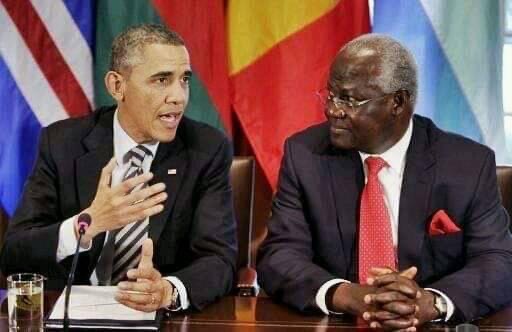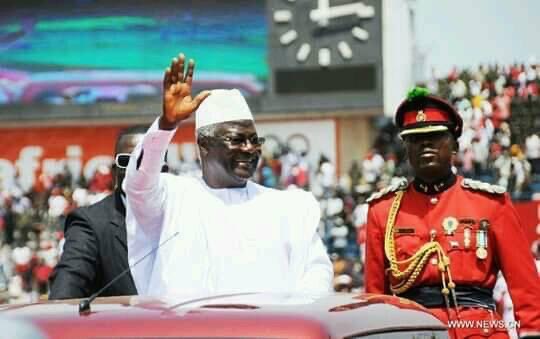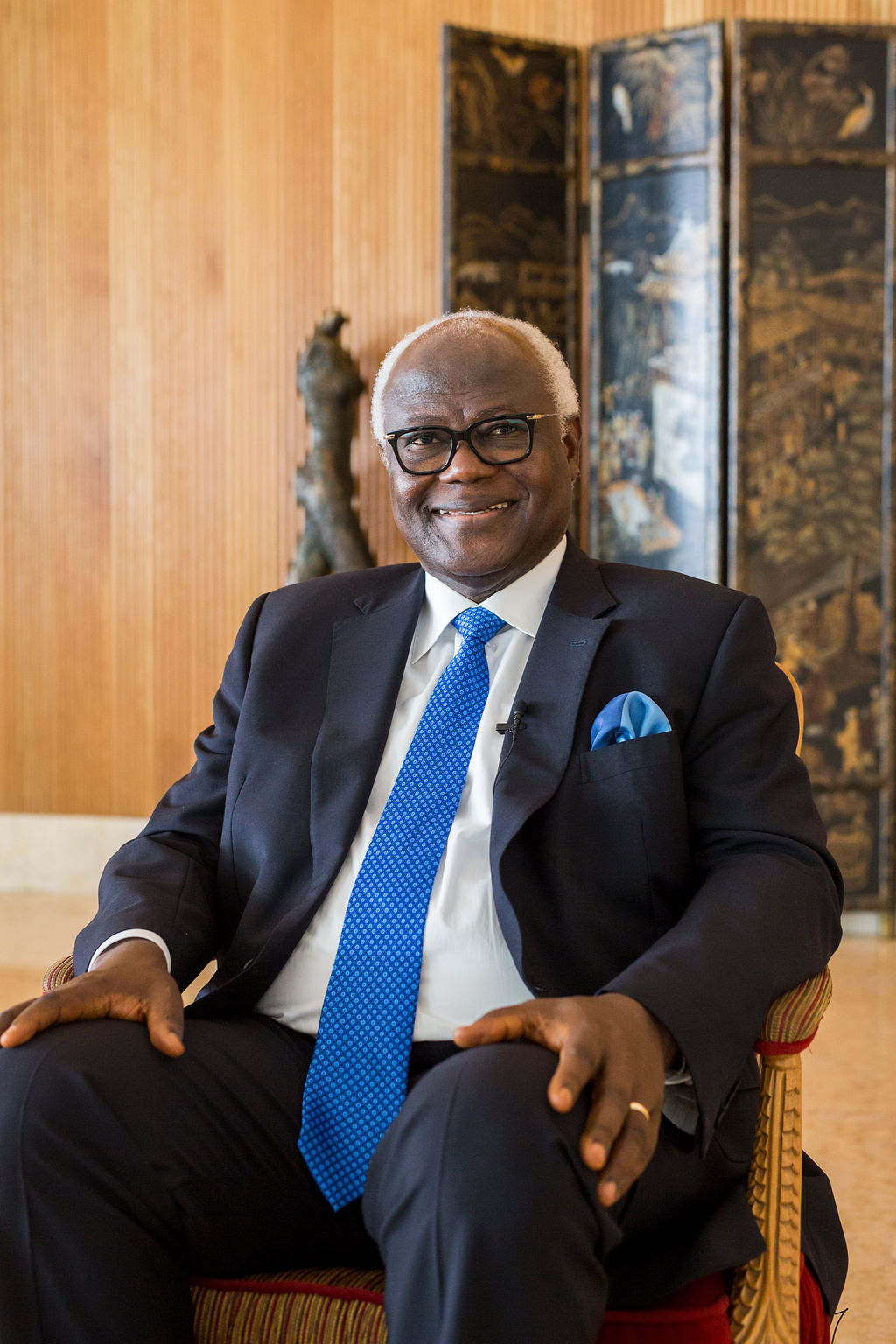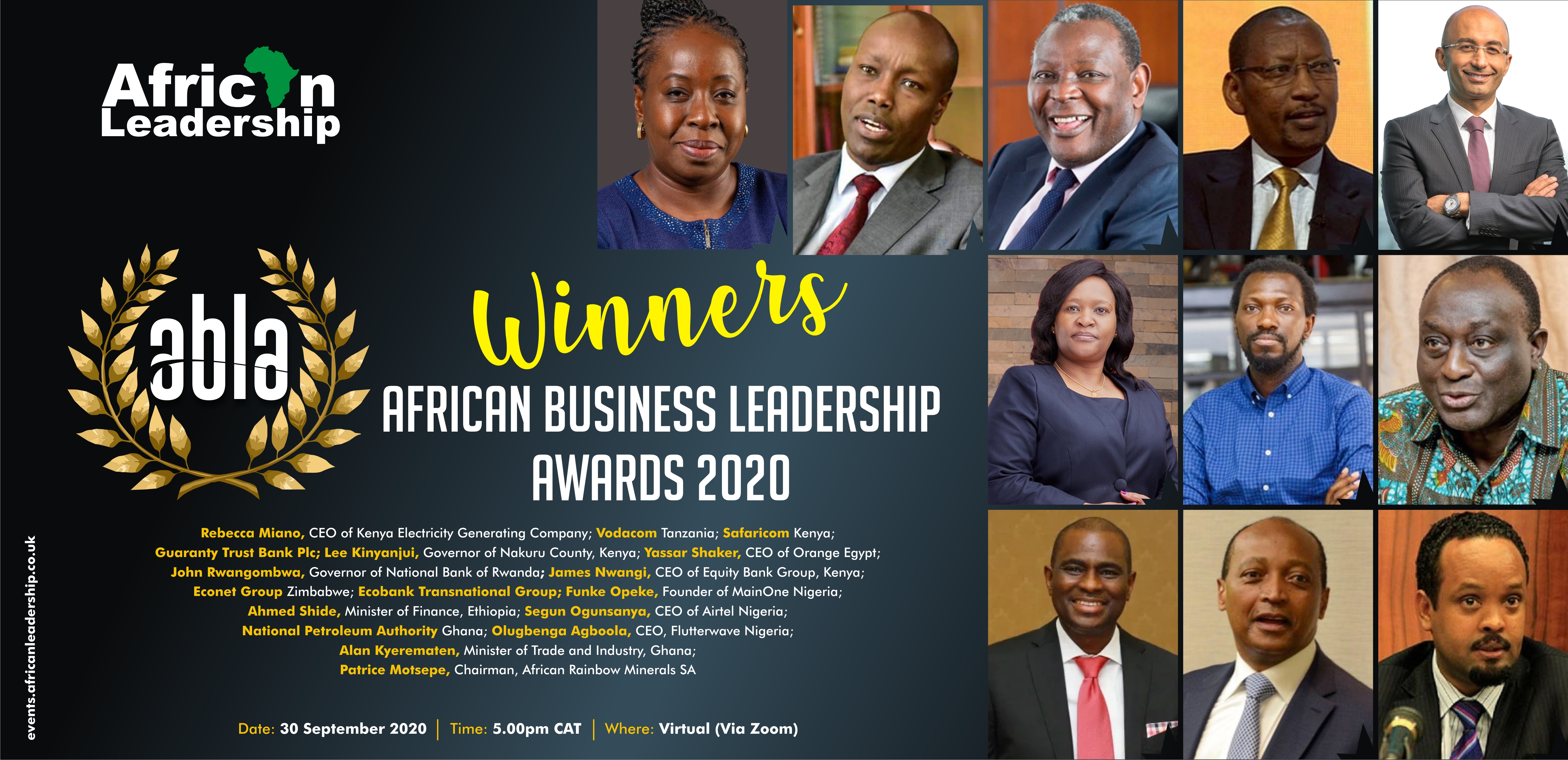Elected as the 4th President of Sierra Leone in 2007, after five years in the Parliament, His Excellency Ernest Bai Koroma was faced with the arduous task of rebuilding a country devastated by ten years of war which had only ended in 2002. He met this new challenge with enthusiasm, and within weeks of being elected, he identified priority sectors that were capable of leapfrogging economic development and sought the support of the international community to activate these sectors. His approach paid off and generated the much-needed confidence and support, which contributed to the turnaround that the country experienced under his watch.
To his credit, Sierra Leone was reported to represent one of the world’s most successful cases of post-conflict recovery, peacekeeping and Peacebuilding, according to the then UN Secretary-General, Ban Ki-moon. He not only transitioned Sierra Leone from a fragile post-war state to the most peaceful country in West Africa, but the country was also ranked 4th most peaceful African country in 2018.
Post presidency, he has remained one of the continent’s frontline leaders, helping to foster peace, deepen democracy, and promote responsible environmental practices, among other noble ideals. In this exclusive interview with African Leadership Magazine, he talks about leadership in the continent; the Coup in Mali; life after the presidency, among other significant issues. Excerpts
- You were elected the 4th President of Sierra Leone in 2007, and you led the reconstruction of the country that was hitherto devastated by war. Your love for your people and strides in governance have remained lessons in leadership for other leaders across the continent. What factors would you say were responsible for the successes recorded under your administration?
Let me, first of all, use this opportunity to once more thank the people of Sierra Leone for giving me the mandate to serve them for two consecutive terms. I remain incredibly grateful to my fellow citizens and God for that. I believe very many factors contributed to the successes recorded during my tenure as President of the Republic of Sierra Leone.
- First among these was our decision to bridge the regional divide in our body politics. Regardless of which region or tribe, we believed that individuals had a role to play at any level they deemed suitable and competent.
- The media, civil society, opposition supporters, and leaders enjoyed the liberty to hold my Government accountable – we had no political prisoners or prisoners of conscience. It was such recognition of unity in diversity, public participation, and freedoms that fostered the unprecedented national cohesion our nation enjoyed during my tenure.
- We also emphasized openness and transparency in governance. The Open Government Initiative / Partnership (OGI/OGP) in the Office of the President created the platform for members of the public to contribute to policy formulation.
And to give feedback on government programs and project implementation. The Audit Service carried out its functions and published its annual reports unfettered, thereby generating vigorous public discussions about public finance management. It never happened before!
- Critically, as soon as we came into Government, our first significant action was to reform the anti-corruption legislation, giving more autonomy to the Anti-Corruption Commission (ACC). It now has the power not only to investigate but to prosecute as well: we created an institution to fight corruption and strengthen transparency. We designed and rolled out the ‘Pay No Bribe Campaign’, which brought tremendous results. The United Nations Commission against Corruption (UNCAC) undertook crucial actions to ensure compliance with the provisions of the statute. One of these was by facilitating two-country reviews on the implementation. In 2010 and 2012, as a result of the steps taken to address corruption, we were reviewed by Thailand and Benin. In essence, my reforms allowed the country’s independent anti-corruption agents to be one of the most efficient prosecutorial groups in Africa, with the Anti-Corruption Commission (ACC) acting as a politically blind institution, prosecuting and convicting members of all political parties. This non-partisan approach enhanced the credibility and transparency of the process in place as it safeguarded the human rights of all citizens.

We also enacted the Freedom of Information (FOI). Act and established the Access to Information Commission, ensuring that ordinary citizens could seek and obtain information that otherwise may be considered classified. In other words, during my tenure, there wasn’t anything to hide in the course of public service.
- We were so confident of our work that I subjected my government to the African Peer Review Mechanism, and we received important reviews from President Obama who, in his ‘Address to the African People’ (during his 2015 visit to Africa), said that ‘Sierra Leone was among countries in Africa where democracy had taken root’. Also, Sierra Leone was recognized as the third most improved country in the region in terms of safety and the rule of law, participation, and Human Rights as per the Ibrahim Index of African Governance
- Regarding peace, the former UN Secretary-General, Ban-Ki -Moon, once remarked that Sierra Leone was a storehouse of lessons in peacebuilding and peace consolidation in post-conflict countries. Our peacebuilding and peacekeeping missions with the UN were so successful that Sierra Leone exported these missions to train other countries. We succeeded in ensuring that during my time of governance Sierra Leone was ranked the most peaceful in the region and third in Africa.
- With such openness, good governance, and peacefulness, we sent the right signals to the world that Sierra Leone was open for business. The result was unprecedented with the arrival of direct foreign investment, especially in the agriculture and extractive industry, where thousands of job opportunities were created for our youth.
- Let me talk a little bit about the youth. In Sierra Leone as in Africa, over 60% of our population is youth. They have the energy, but we have to provide them with skills and the enabling environment to realize their potentials and to thrive. During my tenure, I insisted on reforming the youth sector, initiated many youths development schemes, and ensured they had opportunities to be in key decision-making positions in the cabinet, at directorate and managerial levels, and many have made me proud. I continue to have a strong passion for the youth, to tap on their resilience and desires towards the future of Africa. As I have always said, the present and future of the continent lie in their hands; it is up to us to be visionary, inclusive and to believe in upholding the democratic values. I know that our youth have the potential to transform Africa into the powerful engine of our world.
- Owing to all of those actions on good governance, inclusiveness, transparency and accountability, national unity and peace, unprecedented FDI inflow, and the prudent public finance management of the revenues generated, we increased our GDP which by 2013 was projected by the IMF and World Bank to grow by 14% to the extent that we were rated one of the fastest-growing economies in the world.
- We then judiciously used the revenues to embark on a massive infrastructural development program, and some of my flagship projects touched on every region and every district. Our access to electricity and pipe-borne water programmed brought power and clean water to several areas and communities, some for the first time in three decades.
- We subsidized education at all levels, offered automatic university scholarships to females studying in the sciences and to persons with a disability; supported the establishment of three universities, and increased salaries for public sector workers.
- In the health sector, we implemented a Free Health Care programme for pregnant women, lactating mothers and children under five years, (re)built peripheral health units, (regional) hospitals. In the western area alone, we created a hundred-bed capacity each in five communities. My wife, Sia, who is very passionate about women and girls embarked on a range of campaigns. Her programs are aimed at protecting their rights, especially regarding early child marriage and expanding their access to health care services. Her advocacy greatly influenced the enactment of the Three Gender Laws, which were genuinely revolutionary in guaranteeing the rights of women in Sierra Leone.
- These and other social interventions changed the dynamics and put us on a stable growth trajectory – en-route to attaining middle-income status. The sheer scale and breadth of my Government’s development programmes, and their national appeal along with the job opportunities created engendered peace and security – to give us a very desirable scorecard in the global peace index. Most people thought it was our greatest achievement, and that order must be maintained at all cost because a threat to our peace is a threat to our development. I am incredibly proud of the peace and the turnaround we achieved in the various sectors.
- You contributed immensely towards the promotion of sustainable peace in Sierra Leone and by extension, the West African sub-region. How did you achieve this, and what lessons can other leaders learn from you, as they face significant threats to peace and security in various countries?
Peace is perhaps an essential ingredient for sustainable development – but it doesn’t always come easy. It takes a lot of sacrifices, patience, courage and determination to achieve. Fortunately for us in Sierra Leone, there was already the realization that our eleven-year civil war only succeeded in reversing whatever gains we had made after independence. The cost to human lives was colossal, and because we suffered those atrocities that made our war the most atrocious in modern times, the penultimate decision was to say never again!! This consciousness resonated with every Sierra Leonean, my Government made conscious efforts to develop and empower those structures that were responsible for national peace and cohesion. Thus, it is safe to say that the order we enjoyed during my tenure as President was not due to my singular efforts but through the contributions and sacrifices made by every critical stakeholder in Sierra Leone, the sub-region and the international community. What other leaders who want to promote and consolidate peace in their respective countries can learn from us is the ability to consult and negotiate with both state and non-state actors genuinely. Also, as I said earlier, national cohesion and political tolerance are existential relevance to anything we do to attain sustainable peace in Africa.

- Major countries on the continent have remained mono-economies, with minimal success in economic diversification. However, under your leadership, Sierra Leone’s Agenda for Prosperity was hinged on Economic Diversification – how were you able to achieve this?
One of my priorities was to run the country like a business. This essentially means leveraging upon every opportunity available to expand and grow our economy by first, marketing Sierra Leone as a favorable business destination. For decades, we had mostly depended on the extractive industry. Minerals like gold and diamonds cannot be in abundance forever. The agriculture sector, which use to account for about 45% of the GDP was mostly underdeveloped and subsistence-based. We immediately went into action by introducing agricultural commercialization through smallholder farmers’ Scheme – intensifying production and promoting value addition of major crops like rice, cocoa, coffee, and cassava. Despite the several challenges encountered, the program yielded a high dividend and was able to transform lives and boost the economy. Our economic diversification also saw us embarking on the most significant road infrastructure programme in the history of the country. All major cities were linked to the Capital by hundreds of kilometres of tarred roads and thousands of kilometers of feeder roads linking producing areas to big market centers. Our development plan – the Agenda for Prosperity – was encapsulated into eight pillars, namely; economic diversification, natural resources management, Human development, Competitiveness, Employment, Social Protection and Gender and Women’s empowerment.
- Infrastructure remains one of Africa’s primary challenges. According to the African Development Bank, Africa needs about $130 to $170 billion per year to address its infrastructure gaps – what in your view can be done to leapfrog the development of critical infrastructure for economic growth and development in the continent?
There are several ways to address this, but one key parameter in my view is for us to be able to harness our natural resources and use them for the benefit of all. The gaps we experience in the health and education sectors, for instance, are all down to the severe infrastructural deficit we face as a continent. For Africa to be able to take its rightful place on the global agenda, we must be able to tap into our God-given resources (both human and natural resources) and judiciously utilize them for the benefit of all. Establishing a pool of dependable professionals with a patriotic mindset can also help in this direction.
This brings me to an innovative initiative that I endorsed in 2019 at the Global Visions Community of Horasis in Portugal. We have been working to bring it into the African context and to develop it by Africans for Africa, I won’t discuss this much, but it is the idea and concept of establishing an African Peace Engineering Corps. This initiative takes into account addressing the futures of our youth, women, and military. It looks to enhance the African Peace Architecture by addressing many of the core issues of ongoing peace and security challenges. I will also highlight the interlinkages between Peacebuilding, engineering, and sustainable development. Peace could be waged in a genuinely innovative, collaborative, and sustainable way.
With more engineering and peacebuilding training for our youth, women and military, we shall have the capacity to develop, in alignment with the UNSDG, an innovative capacity-building platform in the engineering sector and Peacebuilding efforts throughout Africa. The members of these Corps shall be recruited from militaries around Africa for skill acquisition and concrete operational training. We are presently learning more about the various existing models in the engineering corps in Africa, Europe, Asia, and North America to devise the most appropriate model for this innovative initiative. As such, it shall also integrate the best practices based on practical experience gained from Peace Building operations in Africa. Now more than ever before the continent needs to be united in rebuilding in all areas.
- In 2014 Sierra Leone was the hardest hit by the deadly Ebola disease, but, your leadership, helped in managing and taming the dreaded disease. What lessons can leaders learn from your experience, as the world battles the COVID-19 pandemic?
Ebola, like the current Coronavirus outbreak, was novel to Sierra Leone but that didn’t dampen our resilience to tackle it head-on. In the initial days of the epidemic, there was resistance from many people to accept the existence of the disease. Conspiracy theories also fueled mistrust between the Government and the citizenry. In effect, Ebola became a political tool effectively used by those who didn’t mean well. These conspiracy theories became a severe challenge in our fight to break the chain in transmission.
In some communities, response workers were reportedly chased out by the inhabitants they were there to help. The consequences were grave! Ebola dealt a severe blow to our country – we lost about 4,000 of our compatriots, we had to close down schools, farmers ran away from their fields, foreign businesses shut down, and our country practically came to a halt. By the time we defeated Ebola, our economy had shrunk to -21%. You can imagine the devastating impact. But with the right policies ensuring peace, a friendly investment climate, international support, and the resilience of our people, my Government was able to dig up the economy from the depth of -21% to projected growth of 5% by the time I left office.
One major lesson we can learn from the Sierra Leone situation is that without adequate and cohesive social mobilization, especially at the grassroots level, combating outbreaks like Ebola or COVID-19 shall remain herculean. It also requires unqualified political will genuinely leading the fight in a truly inclusive way. In my case, I became the undisputed ‘chief social mobilizer personally visiting affected communities, treatment centers, rallying around health care workers, Political, religious, traditional, secrete society and opinion other leaders to help demystify the myths and promote behavioral change in communities. In societies that are deep in cultural traditions and heavily polarised along ethnic and political lines, the involvement of every governmental entity and other interest groups must be prioritized. I also believe we must heavily invest in our health infrastructure. A weak health infrastructure represents a fertile ground for disease outbreaks to fester. As I have stated, it requires unqualified exemplary political leadership leading from the front and bringing on board all stakeholders.
- There should be a streamlined, public information and communication structure capable of providing clear, precise, and unambiguous public health messages.
- There should be a united, cohesive social mobilization, and an effective contact tracing mechanism.
- There should be effective Isolation and treatment by qualified doctors and other health caregivers motivated with protective equipment and other essential medical supplies as well as financial incentives.
Psycho-social support to survivors and affected families is also vital in stemming new transmissions. It has been brought to my attention over these last two years that our actions and effort to fight Ebola are recognized globally and have been useful in fighting against COVID-19.
- Seventy-five years on and Africa has continued to push for a seat at United Nations Security Council. As Chairman of the Committee of ten Heads of States which were mandated by the African Union to articulate the common African position on the reform of the United Nations Security Council, what is your take on Africa’s future at the UN?
I think the world at large is beginning to see and appreciate why Africa must be treated with the seriousness it deserves. The African Union has been pushing hard on this, and we hope and insist that Africa gets its seat at the table. We aim to be fully involved in the decision-making process at the United Nations – with particular reference to the Security Council. We no longer want to be seen, but we want to be heard as well. At the moment,
much progress has been made, and I am hopeful for a brighter future for Africa on the UN Security Council. Our continued absence at that level of global decision-making is no longer justified. It’s a grave injustice that must urgently be addressed. At the same time, All Africa must rally around on this call and present a definite unified position in a more direct and determined way. The UN must be made to understand that this is something we feel strongly about and on which the continent’s continued participation in the UN is hinged upon.
- You are a prominent member of the “Campaign for Nature’s Global Steering Committee” with the overarching purpose of calling on world leaders to support a new global goal to protect at least 30 percent of the planet’s land and ocean by 2030. Tell us more about the workings of the group?
This is a fundamental question. Like you rightly said, our goal is to advocate for the protection of at least 30% of the land and water ecosystems of the earth.
The campaign is based on the scientifically proven hypothesis that if we do not act now, there will be a monumental loss of global biodiversity, and life on earth will become under serious threat. The answer to this is a decrease in carbon emissions and a halt to other destructive activities on the environment. The initiative itself belongs to the Wyss Foundation in partnership with National Geographic’s, and Global Steering Committee is made up of mostly former leaders across the globe – from 16 countries and led by Former Senator Feingold. Currently, we have made bold statements – calling on world leaders to heed this advice, and we are also working on several advocacy strategies in this direction.
Throughout the world, and indeed across Africa, local communities around protected areas are suffering and need help. We are one world we are all so connected, and we can see it now with this global pandemic. We have shared interests in all of what we do,
it is no longer the case to sit somewhere in your comfort zone and believing that the happenings in Africa will not impact your lives.
- A recent report by the African Union projects that the continent may lose about 20 Million jobs due to the COVID-19 pandemic. What can be done to mitigate jobs and SME fails?
This is a tough one, but it is often said that out of difficulties, opportunities will arise. The COVID-19 pandemic may have brought untold loss to small-scale enterprises. Still, I also believe a little bit of innovation and utilization of emerging markets in the IT industry can make a difference. SMEs across the world must utilize every opportunity the IT revolution provides to make a profit and change the dynamics. One doesn’t have to be an expert in IT, to appreciate that businesses flourish through the application of various software or platforms to conduct their activities. Governments can also help with bailout packages to struggling companies so that their employees will not lose their jobs. Above all, a much more coordinated approach to stopping the disease is paramount.
 As a member of the Presidential team that negotiated the peace deal in the Gambia; what will be your view should be done to restore peace in Mali?
As a member of the Presidential team that negotiated the peace deal in the Gambia; what will be your view should be done to restore peace in Mali?
We were hoping for the better in Mali, but regrettably, things have taken a different turn. All sides to the conflict must understand the need to negotiate a way out of this unacceptable turn of events. Such needless escalation in Mali has the propensity to destabilize the entire sub-region. Coups are no more the answer to our political or economic problems. I, therefore, believe that ECOWAS has risen well to the occasion. The imposition of economic sanctions on Mali deserves the support of all member states. Constitutional order must be restored.
We have too many security challenges on the continent to deal with, we including you in the media and civil society must all, therefore, do everything to prevent another conflict in Africa. Peace is what we need to be able to focus on our continent’s development aspirations of harnessing the youth dividend because of the opportunities in ICTs, the cultivation of our vast expanse of arable land for agricultural productivity, transformation, commercialization and other job creation opportunities.
- Post-presidency, what have you been up to? And what should we be expecting in the coming months?
Well, I have been enjoying my quiet and peaceful family life here in Sierra Leone, including being a grandfather. I will, however, be looking forward to implementing a few programs I believe that can add value to the lives of my fellow citizens and other people across Africa and the world. We have to spread the message of peace, and sustainable development where everyone will have the moral responsibility to take part in the growth Africa has always yearned for. I did not retire from the presidency to sit back and look as the world revolves; I am on my feet to help erect those pillars to make the world especially Africa a better place for generations to come.
In light of this, I have availed myself to the AU, ECOWAS, the Commonwealth, and to the UN to support our collective search for peace, good governance, democracy, and sustainable development. I have joined the Global Steering Committee on the Campaign for Nature to lend my energy and voice to the global concern for better management of our environment. As an avid supporter of youth and women empowerment, I am also seeking partnerships to youth empowerment initiatives. As you can see, I intend to be a very active retiree.


